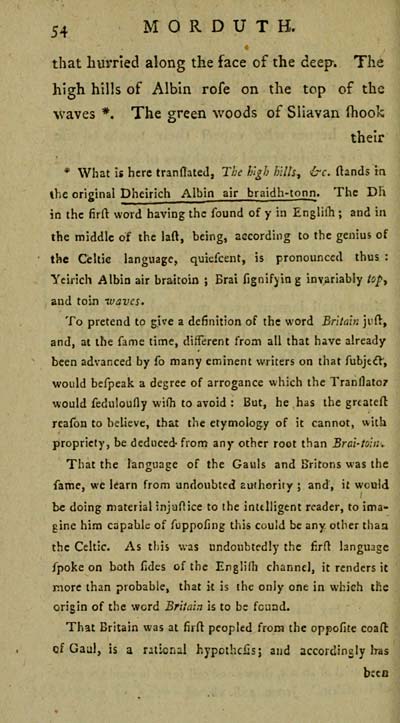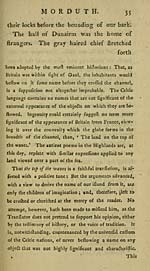Download files
Complete book:
Individual page:
Thumbnail gallery: Grid view | List view

54 M O R D U T H.
that hurried along the face of the deep. The
high hills of Albin rofe on the top of the
vaves *, The green woods of Siiavan ftiook
their
♦ What is here tranflated, The high h'llh^ ire. ftands in
ihc original Dhe irich Albin air braidh-tonn . The Dh
in the firft word having the found of y in Englilh ; and in
the middle of the laft, being, aecording to the genius of
the Cieltic language, quiefcent, is pronounced thus :
Ycirich Albin air braitoin ; Brai fignifying invariably /c/,
and toin tuavcs.
To pretend to give a definition of the word Britain juft,
and, at the fame time, different from all that have already
been advanced by fo many eminent writers on that fubjt(f^,
would befpeak a degree of arrogance which the Tranllalo/
would feduloufly wifii to avoid : But, he has the grtateft
reafbn to believe, that the etymology of it cannot, with
propriety, be deduced- from any other root than Brai-tohu
That the language of the Gauls and Sritons was the
fame, we learn from undoubted Euthority ; and, it would
be doing material injuOice to the intelligent reader, to ima-
gine him capable of fuppofing this could be any other thaa
the Celtic. As this was undoubtedly the firfl language
fpoke on both fides of the Englifl) channel, it renders it
more than probable, that it is the only one in which the
origin of the word Britain is to be fcuad.
That Britain was at firft peopled from the oppofite coafb
of Gaal, is a rational hypotheiis; and accordinely h-as
bccB
that hurried along the face of the deep. The
high hills of Albin rofe on the top of the
vaves *, The green woods of Siiavan ftiook
their
♦ What is here tranflated, The high h'llh^ ire. ftands in
ihc original Dhe irich Albin air braidh-tonn . The Dh
in the firft word having the found of y in Englilh ; and in
the middle of the laft, being, aecording to the genius of
the Cieltic language, quiefcent, is pronounced thus :
Ycirich Albin air braitoin ; Brai fignifying invariably /c/,
and toin tuavcs.
To pretend to give a definition of the word Britain juft,
and, at the fame time, different from all that have already
been advanced by fo many eminent writers on that fubjt(f^,
would befpeak a degree of arrogance which the Tranllalo/
would feduloufly wifii to avoid : But, he has the grtateft
reafbn to believe, that the etymology of it cannot, with
propriety, be deduced- from any other root than Brai-tohu
That the language of the Gauls and Sritons was the
fame, we learn from undoubted Euthority ; and, it would
be doing material injuOice to the intelligent reader, to ima-
gine him capable of fuppofing this could be any other thaa
the Celtic. As this was undoubtedly the firfl language
fpoke on both fides of the Englifl) channel, it renders it
more than probable, that it is the only one in which the
origin of the word Britain is to be fcuad.
That Britain was at firft peopled from the oppofite coafb
of Gaal, is a rational hypotheiis; and accordinely h-as
bccB
Set display mode to: Large image | Transcription
Images and transcriptions on this page, including medium image downloads, may be used under the Creative Commons Attribution 4.0 International Licence unless otherwise stated. ![]()
| Early Gaelic Book Collections > J. F. Campbell Collection > Works of the Caledonian bards > (62) |
|---|
| Permanent URL | https://digital.nls.uk/82480328 |
|---|
| Description | Volumes from a collection of 610 books rich in Highland folklore, Ossianic literature and other Celtic subjects. Many of the books annotated by John Francis Campbell of Islay, who assembled the collection. |
|---|
| Description | Selected items from five 'Special and Named Printed Collections'. Includes books in Gaelic and other Celtic languages, works about the Gaels, their languages, literature, culture and history. |
|---|

